What if a movement that claims to uphold biblical prophecy and the teachings of Jesus has instead fueled division, political power struggles, and anti-Semitic stereotypes?
Summary
Christian Zionism, a movement that advocates for unconditional support of Israel, has deeply shaped American evangelicalism. While it promises solidarity with Jewish people, Christian Zionism is closely tied to United States foreign policy, economic interests, and apocalyptic theology. Critics argue that it often reduces Jews and Palestinians to roles in a prophetic narrative that prioritizes land and power over people.
This article explores the historical roots of Christian Zionism, from its theological beginnings during the Protestant Reformation to its rise as a political force in the twentieth century. By examining its contradictions, ethical consequences, and political connections, we ask whether this movement reflects the teachings of Jesus.
The Protestant Reformation and the Rise of Literalism
The Protestant Reformation disrupted entrenched systems of power and faith in Europe, challenging the dominance of the Catholic Church. Reformers like Martin Luther and John Calvin emphasized sola scriptura, the idea that Scripture alone is the ultimate authority. While this empowered individuals to interpret the Bible, it also fractured religious unity and encouraged rigid, literalist readings of prophetic texts.
Martin Luther initially expressed sympathy toward Jewish communities, hoping they would embrace his reformist theology. When these hopes were unmet, his tone shifted dramatically. In his 1543 treatise On the Jews and Their Lies, he called for the destruction of synagogues and the confiscation of Jewish property, embedding anti-Semitic sentiments into Protestant thought and influencing attitudes for centuries.
John Calvin, in his Institutes of the Christian Religion, emphasized predestination and God’s sovereignty, interpreting Jewish rejection of Christ as divinely ordained. His writings, widely influential through Protestant societies, reinforced exclusionary ideologies and framed governance as subject to divine authority. By promoting literal interpretations of Scripture, Calvin’s theology contributed to a worldview where religious prophecy and political power were intertwined.
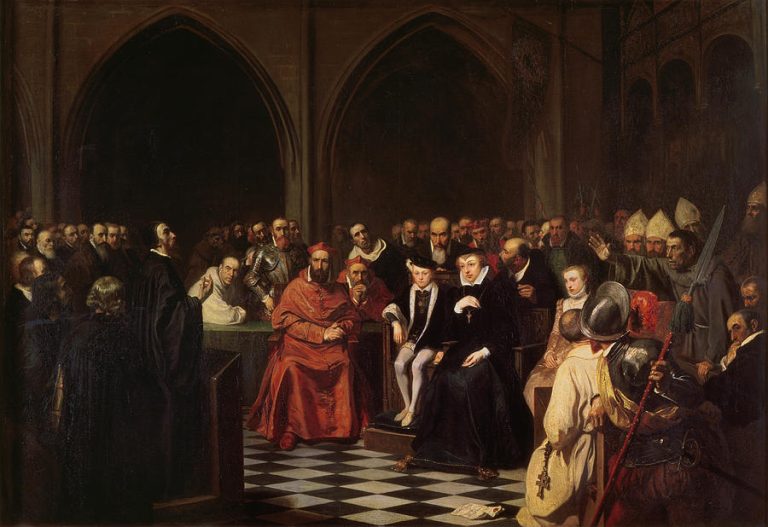
The 1561 Colloquy of Poissy: A pivotal effort to unite France’s Catholics and Huguenots
The Reformation’s theological shifts also destabilized political landscapes. Monarchs like Catherine de’ Medici and Mary Queen of Scots navigated the era’s religious conflicts, striving for stability. Catherine sought tolerance through measures like the Edict of Saint-Germain, while Mary’s Catholicism made her a target for reformers like John Knox, whose writings condemned her faith as a threat to Scotland’s morality. Their struggles highlight how the Reformation tied faith to governance, setting the stage for later movements like Christian Zionism, where literal readings of prophecy shaped political agendas.
Puritans and the Roots of Christian Zionism
In the seventeenth century, Puritans believed they were a New Israel, chosen by God to establish a society that reflected divine values on Earth. John Winthrop articulated this vision in his sermon A Model of Christian Charity, describing their community as a “city upon a hill,” meant to serve as a beacon of spiritual purity. While the Puritans revered the Jewish role in biblical history, they saw Jews as spiritually incomplete, believing their eventual conversion to Christianity was necessary to fulfill God’s plan.
This prophetic outlook even shaped national policies. In 1656, Oliver Cromwell permitted Jews to return to England after centuries of exile. For Cromwell and many Puritans, this move aligned with biblical prophecy, as they believed the Jewish return was a step toward the eventual Second Coming of Christ. However, Cromwell also recognized the practical benefits of readmitting Jews, including their expertise in finance and trade, which he saw as a way to strengthen England’s economy. This blending of theological belief with pragmatic politics set a precedent for modern Christian Zionism, where religious prophecy often drives political decisions.
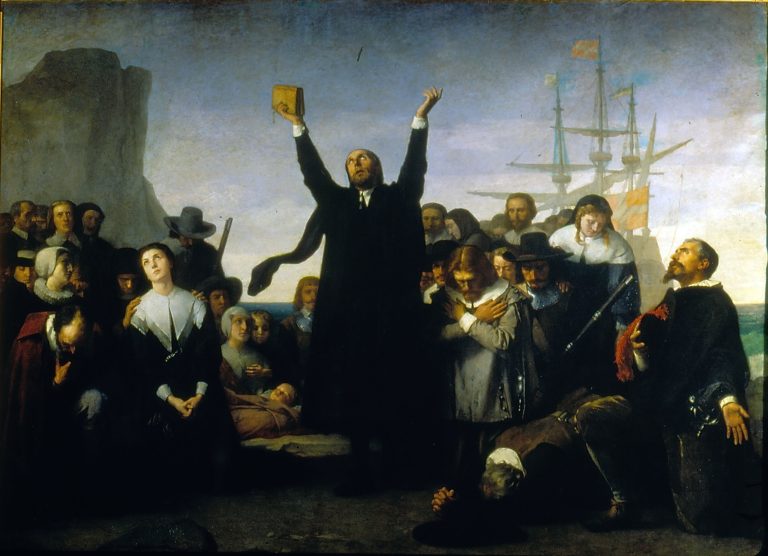
Antonio Gisbert’s Desembarco de los Puritanos en América depicts the
1620 arrival of Puritans, driven by their vision of a ‘New Israel’
Puritans further tied Jewish history to their apocalyptic expectations, believing that Christ’s return required the fulfillment of certain biblical prophecies. These ideas evolved into dispensationalism, a framework that is central to Christian Zionism. Like the Puritans, dispensationalism assigns Jews a key role in prophecy but often reduces their identity to fulfilling Christian narratives. By framing themselves as God’s chosen people and focusing on prophecy, the Puritans laid the foundation for modern evangelical support of Israel, where religious stories frequently take precedence over the rights and lived experiences of real people.
Theological Prophecy Meets Political Reality
In the nineteenth century, John Nelson Darby introduced dispensationalism, a framework that divided history into distinct eras of divine interaction. Darby argued that the Jewish return to Palestine was necessary for the Second Coming of Christ. His writings, including The Hopes of the Church of God, popularized these ideas, which gained wider influence through the Scofield Reference Bible. This annotated Bible interpreted passages like Ezekiel 37 as literal predictions of Israel’s restoration and became a cornerstone of evangelical theology.
The Balfour Declaration of 1917 further fueled Christian Zionist expectations. This statement by the British government expressed support for the establishment of a national home for the Jewish people in Palestine. Preserved through the Avalon Project at Yale, the declaration symbolized a convergence of religious prophecy and political pragmatism. Letters between figures like Chaim Weizmann and British officials reveal how these forces shaped the document. For Christian Zionists, it represented a step toward fulfilling prophecy. For Jewish communities, it offered hope but also cast them as participants in another group’s theological narrative.
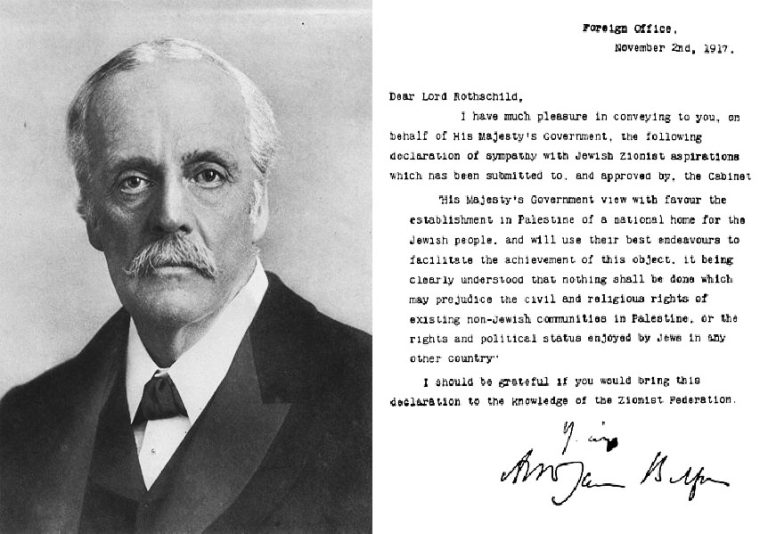
Arthur Balfour and the 1917 Declaration: A cornerstone of Christian Zionism,
merging prophetic beliefs with British support for a Jewish homeland in Palestine
In the post-war United States, evangelicalism surged, intertwining religion with Cold War patriotism. Figures like Billy Graham framed faith as a defense against communism, describing it as “a religion inspired by the devil himself.” Support for Israel became a theological and political necessity within this framework, further mainstreaming Christian Zionism. Organizations like John Hagee’s Christians United for Israel (CUFI) emerged as powerful lobbying forces, aligning evangelical theology with U.S. foreign policy. CUFI’s influence, along with legislation like the Jerusalem Embassy Act of 1995, reflected the belief that Israel’s territorial claims were divinely ordained.
Faith, Politics, and the Influence of Christian Zionism
Christian Zionism wields significant influence on U.S. foreign policy, notably through groups like Christians United for Israel (CUFI) and the American Israel Public Affairs Committee (AIPAC). In 2017, President Trump’s recognition of Jerusalem as Israel’s capital and the U.S. embassy relocation were celebrated by some as fulfilling biblical prophecy but criticized by others for sidelining Palestinian claims and escalating tensions.
AIPAC has become a major force in U.S. elections, spending over $100 million in the 2024 cycle to support pro-Israel candidates. According to The Intercept, the group backed 389 candidates, with bipartisan contributions totaling $28 million to Democrats and $17 million to Republicans. In North Carolina, Congresswoman Valerie Foushee received nearly $2 million from AIPAC during her 2022 campaign, sparking debate over donor influence on policy priorities.
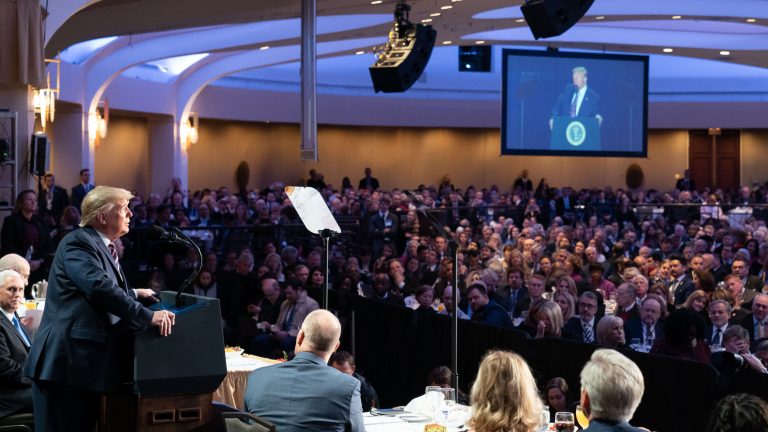
President Trump at the 2020 National Prayer Breakfast in Washington, D.C.
Events like the National Prayer Breakfast often promote Christian Zionist narratives, framing support for Israel as a spiritual duty. Speaking at the Prayer Breakfast in 2016, President Obama warned of faith being “twisted and distorted, used as a wedge—or, worse, sometimes used as a weapon,” a sentiment that resonates in the context of Christian Zionism. Critics argue that such rhetoric can overshadow humanitarian concerns and shape policies that marginalize Palestinians.
By prioritizing theological narratives over practical solutions, Christian Zionism raises ethical questions about the intersection of faith and politics and its impact on communities, including Palestinian Christians.
Ethical and Humanitarian Concerns
While Christian Zionism views Israel as central to prophecy, it raises significant ethical questions. Jewish people are often reduced to symbols in a prophetic narrative, overshadowing their humanity and diverse experiences. Norman Finkelstein, a Jewish scholar and critic of political Zionism, has highlighted how religious and nationalist ideologies can obscure the rights of individuals in favor of broader theological or territorial agendas. In his interview with The Real News Network, Finkelstein emphasizes the importance of justice and equality, arguing that prioritizing ideology over humanity undermines the prospects for peace.
Palestinian Christians have also suffered significantly under this framework. The Kairos Palestine document, written by Palestinian Christian leaders, denounces theologies that justify occupation, asserting that such interpretations are “far from Christian teachings.” According to The New Republic, the erasure of Palestinian Christians is particularly alarming, as their homes, churches, and livelihoods face increasing threats amid political conflict and violence. Despite this, many American churches remain silent, prioritizing eschatological narratives over the lived experiences of a community that has existed in the region for nearly 2,000 years. These realities expose the consequences of prophetic interpretations that prioritize land and prophecy over justice and humanity.
The True Teachings of Jesus: A Challenge to Christian Zionism
Jesus’s teachings focused on love, peace, and spiritual transformation, values that directly contradict the principles behind Christian Zionism. In Matthew 5:44, He instructed, “Love your enemies and pray for those who persecute you,” emphasizing forgiveness, humility, and reconciliation. In Luke 17:21, Jesus made clear that “The kingdom of God is within you,” pointing to a spiritual change within people, not political control or territorial expansion.
Christian Zionism’s focus on land and prophecy stands in stark contrast to Jesus’s message, which is about loving others, serving those in need, and creating peace, not seeking power or control. In Matthew 25:35, Jesus said, “I was hungry and you gave me something to eat, I was thirsty and you gave me something to drink,” showing that true faith is reflected in caring for the vulnerable, not in political or military pursuits. In Matthew 26:52, Jesus rejected violence, telling His followers, “Put your sword back in its place, for all who draw the sword will die by the sword.”
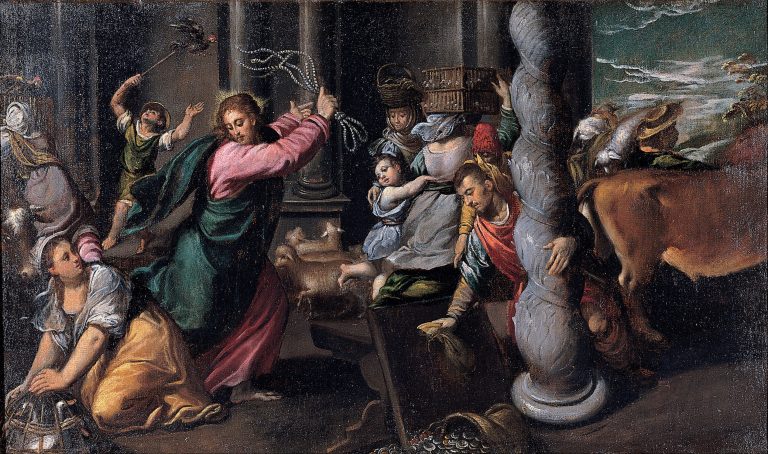
Scarsellino’s Cleansing of the Temple: Jesus drives out merchants and money changers
When Jesus flipped the tables in the temple (Matthew 21:12-13), He challenged those who used religion to serve their own interests. This was a powerful stand against the exploitation of faith for personal or political gain. Similarly, Christian Zionism’s emphasis on land and prophecy misrepresents religious teachings to justify domination, rather than focusing on the well-being of others.
While Christian Zionism promotes territory and power, Jesus’s mission was about spiritual reconciliation, peace, and helping all people, especially those suffering under injustice. His teachings center on peacemaking and love, not the pursuit of power. In a world filled with conflict, Jesus’s message calls His followers to act with humility, understanding, and a commitment to peace.
Fear and Groupthink in Christian Zionism
Christian Zionism often employs fear-based messaging and apocalyptic narratives to justify unwavering support for Israel. This approach fosters groupthink, where the desire for conformity to theological narratives can override critical evaluation of alternative perspectives. Leaders like Greg Locke reinforce this dynamic by framing geopolitical conflicts as divine battles. For example, in an October 7, 2023, tweet, Locke stated, “There’s only ONE response that Israel has… turn Gaza into a parking lot. Level the whole thing. The ‘Palestinian oppression’ is media propaganda. Destroy the terrorists and take back every inch that God gave you.”
Groupthink, a psychological phenomenon where the desire for consensus discourages dissent, often manifests in this context through echo chambers created by prophecy conferences, sermons, and literature. These settings encourage believers to see support for Israel as a spiritual obligation, framing dissent as morally or spiritually dangerous. This dynamic can marginalize voices like those of Palestinian Christians, who often bear the brunt of these policies. Advocacy groups like Friends of Sabeel North America (FOSNA) call for a reevaluation of theologies that justify oppression, promoting instead a vision rooted in peace and justice. However, these perspectives face significant challenges in gaining traction within spaces shaped by Christian Zionist narratives.

Hollywood Road Amarillo Woship Center: A large gathering space for contemporary worship
By prioritizing theological unity over critical engagement, Christian Zionism reflects the dynamics of religious groupthink, where complex geopolitical realities are often reduced to simplified narratives of divine prophecy and moral absolutes.
Reclaiming Christianity and Moving Forward
Christian Zionism raises important questions about faith and politics. Does it align with the teachings of Jesus, or does it prioritize political objectives? The Gospels invite reflection on these issues, portraying Jesus as a figure of peace and justice who rejected earthly power.
Reclaiming Christianity involves returning to these foundational values and using faith as a force for healing and unity. Organizations like Kairos Palestine advocate for justice and reconciliation, emphasizing solidarity over division. This path encourages Christians to consider how their faith can contribute to a more compassionate and just world.





